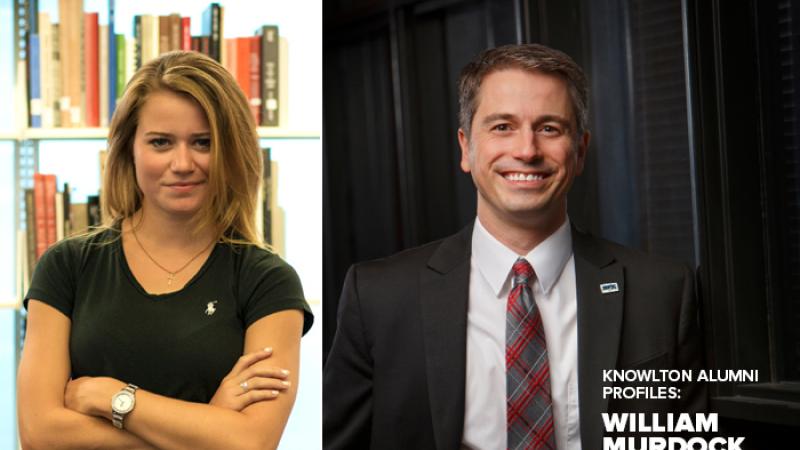Knowlton Alumni Profiles: William Murdock with Megan Hurley
Knowlton School Alumni Profiles is a series that features interviews of school alumni conducted by students who are members of the Knowlton Ambassador Program. In the interviews, alumni discuss how their experiences at the Knowlton School helped prepare them for their careers in architecture, landscape architecture and city and regional planning, and offer advice to current Knowlton students regarding their own career plans. On Wednesday, August 20, 2014, Megan Hurley, a rising senior in the City and Regional Planning program, interviewed William Murdock, Executive Director for the Mid-Ohio Regional Planning Commission, about his academic and career paths.
Megan Hurley: Thank you for taking the time out of your schedule to meet with me today to discuss your academic and career paths in the world of city and regional planning. Can you tell me a little bit about yourself and what academic degree programs you pursued at Ohio State?
William Murdock: I received two undergraduate degrees: a Bachelor of Science in Economics and a Bachelor of Arts in Political Science. I also have two master’s degrees: Master of City and Regional Planning and a Master of Science in Parks, Recreation and Tourism Administration. All of my degrees are from The Ohio State University.
MH: While a student at Knowlton, what were one or two courses within your program that you still apply to your current profession?
WM: Great question. First and foremost, I am still in contact with my advisor, Hazel Morrow-Jones. She has seen my career arc since I was a graduate student. A few of the classes that I still apply to this day were any of my classes with Jack Nasar because I learned different modes of thinking and designing. In addition, my environmental law class helped me learn a variety of policy and legal outcomes and to connect the dots on how law, policy and planning intersect.
MH: What course(s) do you wish you took while a student?
WM: I wish I took a public speaking course while in school. As a planner, you are talking to variety of individuals in multiple settings. I picked up this skill during my internship experience. Also, a public budgeting/accounting course is important if you plan on going into management.
MH: What has your experience been like living and working here in Columbus?
WM: Columbus is my “adopted” hometown. When I was about to graduate, a professional opportunity came up and I knew I wanted to stay in the area since there was a lot of development happening throughout the city.
MH: When you were pursuing both master’s degrees, did you participate in an internship? What was that experience like?
WM: I worked for the City of Gahanna as an intern. During the internship, I worked on a variety of projects from coordinating the local festivals to assisting on planning initiatives. This experience was invaluable.
MH: What led you to your current position as the Executive Director for the Mid-Ohio Regional Planning Commission?
WM: After completing my internship at Gahanna, I was hired on full-time and worked with the city for about 10 years. I was recruited by the state and worked for the Ohio Department of Development for five years working on redevelopment, tax credits, etc. I then transitioned to the Mid-Ohio Regional Planning Commission and have been in my current position for about a year and a half. I am excited about my current opportunity because I enjoy working with local governments and local leaders on projects involving sustainability, housing, etc.
MH: Are there certain skills that you gained while at Knowlton that you currently apply to your job?
WM: I definitely apply the skills I learned at Knowlton to my position. The way in which I work with different groups and communicate ideas was a major skill I learned. In my position, I need to be a liaison to all parties when discussing projects and make all of the ideas relevant to everyone.
MH: Describe a typical day at your job.
WM: There is not a typical day at the office. Throughout the day, I go from one meeting to another that will vary from topic to topic, community to community and agency to agency. Other days, I may be facilitating dialogue with political candidates. It really varies since I hold an internal/external role within the Mid-Ohio Regional Planning Commission.
MH: Describe your job in three words.
WM: Sustainability, mobility and people. Mobility is important because it involves transportation, economic, housing and infrastructure.
MH: How do you stay involved at the Knowlton School?
WH: I am the current president of the Knowlton Alumni Society. I work with the Knowlton Alumni Coordinator, Becky Lonardo, on a variety activities, including the Alumni Mentor program. Also, I still meet up with my advisor and classmates who live in the area.
MH: What advice would you give students who are job or internship searching?
WM: 1. Take advantage of international programs and mentorship programs. I had the opportunity to participate in the Dresden program and it was a great experience for me to explore the world as a planner. 2. When looking at careers, look at an element of the job that can give you a skill set for future experiences. Look at the aspect of that job that you really like and go from there – even if it is a job/career you may have initially ruled out. 3. Participate in informational interviews. It is an opportunity for a student to talk to a professional for an hour about what they do and where they have been – it is a different way to network, but is very beneficial in the long run. 4. Don’t be afraid to reintroduce yourself at a meeting, especially if you met individuals before. 5. Always send a thank you note or email. Employers notice who sends thank-you’s and who does not.


